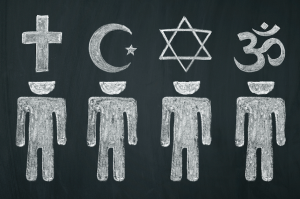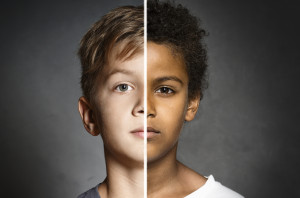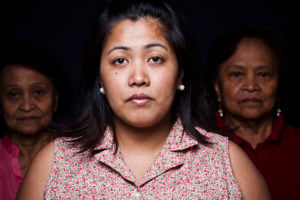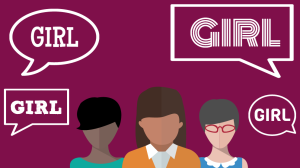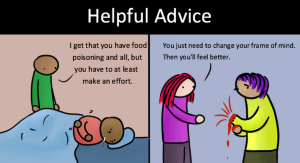We live in a world where monogamy is seen as good, normal, and moral.
On the other hand, polyamory and other forms of non-monogamy are seen as bad, abnormal, and immoral.
Living in a society where we’re constantly bombarded by heteronormative, oppressive myths about romance, love, and sex can be really draining. It can be painful. It can suck.
I remember first coming out as polyamorous and being made to feel confused, worthless, and alone. I had internalized a lot of conservative ideas about polyamory, and I struggled to feel comfortable with my polyamory.
Many of my close family members told me it was wrong and unnatural.
was shaken by the fact that people who raised and loved me could be so bigoted towards an important aspect of my identity.
Many of my friends were similarly critical of my polyamorous relationships.
Adding to that was the lack of polyamorous representation in the media. When polyamory is mentioned in the mainstream media, it’s often represented as deviant and wrong.
Internalizing those messages scarred me and made it difficult to love myself and live my life the way I wanted. As you can imagine, it was a difficult, lonely, horrible time.
And I’m not alone – plenty of polyamorous people are similarly scarred by society’s misrepresentation and criticism of polyamory.
It’s hard not to internalize anti-polyamorous sentiments when you have to face them every single day.
Fortunately, it is possible to heal from those harmful messages. Through the practice of radical self-care, I came to love and celebrate my newfound identity.
It’s incredibly important that non-monogamous people give themselves plenty of healing, validating affirmations to counter the lies and misconceptions about non-monogamy.
Once we begin the process of unlearning compulsory monogamy, we can begin to heal and thrive and love without the heaviness of shame.
Here are a few important affirmations that every polyamorous person deserves to hear.
When you feel like you’ve internalized a toxic societal message, remind yourself of these beautiful, eternal truths.
Read them. Repeat them to yourself every day if you have to. Do whatever it takes to remind your soul that your non-monogamy is powerful, beautiful, and valid.
1. You’re Not Morally Inferior to Monogamous People
As mentioned before, society puts forward the idea that monogamy is moral. This idea is often rooted in religious and heteronormative ideas.
When I first came out as polyamorous, I felt judged by my family, friends, acquaintances, and classmates. I internalized some of their judgement and asked myself whether what I was doing was “ethical.”
Throughout the process of coming out as polyamorous, I found myself having to assure myself of one thing over and over again: Polyamory (or non-monogamy) is not immoral.
Non-monogamy isn’t accepted by a large portion of society, but that doesn’t mean non-monogamy is wrong. It means that society is wrong.
Your ability and desire to date more than one person at once is not an indication of your morals at all. Polyamorous people are not inferior to monogamous people.
And while we’re at it, remember that polyamorous people aren’t necessarily more enlightened than monogamous people.
Polyamory is not inherently better than monogamy, and a great number of issues that arise in monogamous situations can arise in polyamorous situations.
Polyamorous people can also cheat, have toxic relationships, and abuse their partners – we shouldn’t erase the oppression and abuse people face within the polyamorous community.
Whether you’re monogamous or non-monogamous doesn’t determine your morality.
2. You’re Not Greedy
If I had a dollar for every time a monogamous person called me greedy, I might actually be able to pay off my student loans!
There’s this painful myth that polyamorous people are greedy, and that we use polyamory to justify our desire to “possess” many people at once. But if we think about this myth carefully, we can see that it’s really quite unfounded.
Firstly, “greedy” has some strange connotations. “Greedy” implies that your partners are possessions or objects which you don’t want to share with others. This is dehumanizing.
Secondly, “greedy” makes it sound like you’re consuming someone instead of having a mutually beneficial, mature, and compassionate relationship with them.
Lastly, “greedy” makes it sound one-sided. Polyamorous people are not polyamorous because we covet many people at once.
Rather, we are polyamorous because we have the ability and desire to want relationships with many people at once.
Yes, polyamory can mean that you get a great deal of time, love and energy from other people. But it also means you give all of those things in return. It’s not simply about taking from others, but about showering others with love, commitment, friendship and affection. And that’s awesome!
The idea of polyamorous people being “greedy” is dehumanizing and simply incorrect. Polyamory is not about seeking things from others, but about giving others the love you have to offer.
3. You’re Not ‘Just Slutty’
“Wow! That’s a great excuse for sleeping with everyone.”
This was something that was said to me by a friend after I came out to them as polyamorous. They might not have intended for it to be hurtful, but brushing off my identity as an “excuse” to sleep around was really invalidating for me.
Polyamory is often brushed off as an excuse for being “promiscuous” (whatever that means). This is another example of a commonly accepted myth which is really unfounded. There are a few reasons why this idea is problematic.
Firstly, there is nothing wrong with sleeping with many people.
Your body is your own, and as long as you don’t hurt others, sleep with whoever you like. It’s up to you, and nobody has the right to sex-shame you for having sex.
Secondly, plenty of polyamorous people are asexual. This means they experience little or no sexual desire.
Stereotyping all polyamorous people as “slutty” erases asexual people who are also polyamorous.
Thirdly, polyamory is not simply about sleeping with many people. While everyone practices polyamory differently, it’s generally about having multiple committed relationships with informed, consenting partners.
Brushing polyamory off as an excuse to be “slutty” ignores the depth of our relationships and the multitude of different ways our relationships can be structured.
4. Non-Monogamy Can Work in the Long Run
When I tell people that I’m polyamorous, I’m constantly told that polyamory never works out in the long run. Because I’m young, my polyamory is often seen as a fad or an experimental phase.
This feels really invalidating because my sexuality is not a fad – it’s a deeply personal identity which I’ve taken a while to understand.
Additionally, non-monogamous relationships can work in the long-run. I know non-monogamous couples, triads, and families who have been with one another for many years. It’s worked really well for them, and if I commit to honesty and communication, I know non-monogamy can work well for me, too.
But even if something doesn’t work out in the long run, that doesn’t mean it’s invalid now. Society pushes this weird idea that something needs to last forever to be valid – whether it’s a relationship, a gender identity or a political view.
This is not the case.
Fluidity and change are facts of life.
If something changes in the future, it doesn’t mean it’s wrong right now. You might love someone right now, and that love might not last forever, but it doesn’t mean that love isn’t real at this moment in time.
Maybe one day, my feelings towards relationships will change completely and I will start practicing monogamy. But that doesn’t mean that my polyamory right now is invalid, wrong or a “fad.”
5. You Can Have a Family While Practicing Non-Monogamy
Not everyone wants to have a family, and that’s perfectly fine. Some people envision having a family that doesn’t include children, and that’s also perfectly fine.
Society pushes the idea that families need to look and work a certain way in order to be healthy and happy. This includes the idea that there should be two monogamous, heterosexual parents – a woman and a man – and their (biological) children.
But this isn’t true. There are a number of different ways to have families.
As I’ve said before, the important thing in a family is not the quantity of parents or family members, or the structure of the family, but the quality of relationships between family members.
I know plenty of families where some members are polyamorous. These families work really well because they’re based on love, communication and honesty. They might not look like society’s typical idea of the “nuclear family,” but they’re full of compassion and caring.
Whether you have a family or not should, ideally, be determined by whether you want one or not.
The way you experience love, romance, and sex does not determine whether or not you should have a family.
6. It’s Okay to Feel Jealous
Jealousy is a natural feeling for many people. Of course, it’s not a nice feeling, so many people want to avoid it.
Polyamory is often seen as the antithesis of jealousy. This might feel true for some polyamorous people – but it’s entirely possible and normal for polyamorous people to experience jealousy.
There are many ways we can work at our insecurities to avoid feeling unnecessarily jealous. But I’ve noticed that plenty of my polyamorous friends berate themselves for feeling jealous.
I’m not someone who often feels jealous, but when I do, I feel like I’m not “really” polyamorous, or like I’m not a good partner.
When you feel jealous, work through it without over-criticizing yourself.
Remember that jealousy doesn’t invalidate your identity as a non-monogamous person. It also doesn’t mean there’s something wrong with you.
7. Being Polyamorous Isn’t a Sign of Being ‘Broken,’ Insecure, Or Afraid of Commitment
People often assume that polyamorous people are polyamorous because they’ve been cheated on, abandoned, or abused.
I once told someone I was polyamorous, and they asked me, “Who hurt you?” While they were joking, it was a really insensitive, forward, and unfair question. It made me feel like they assumed I was only polyamorous because something was psychologically “wrong” with me.
Some polyamorous people view polyamory as inherent to their souls. They feel that they were born polyamorous.
Other polyamorous people feel that polyamory is a choice they’ve made.
Either way, polyamory is not necessarily a response to psychological pain or trauma.
Firstly, there’s nothing wrong with you if you have any kind of mental illness, insecurity, or fear of commitment. You’re beautiful and perfectly fine as you are.
But secondly, loving people in a way that differs to the societal norm doesn’t mean there’s anything wrong with you. It means something is really wrong with society, because we have such exclusionary ideas about love.
***
Being non-monogamous in a heteronormative world can be incredibly painful, draining, and exhausting.
With all this going on, it’s understandable if you sometimes feel doubtful, worthless, and hurt. For this reason, it’s important to meet society’s hate with validating affirmations.
Allow yourself to heal from harmful societal messages by practicing self-care and self-love.
Remember that you are beautiful, the way you love is beautiful, and your radical non-monogamy is beautiful.
[do_widget id=’text-101′]
Sian Ferguson is a Contributing Writer at Everyday Feminism and a queer, polyamorous, South African feminist who is currently studying towards a Bachelor of Arts majoring in English and Anthropology. Originally from Cape Town, she now studies at Rhodes University in Grahamstown, where she works as vice-chair of the Gender Action Project. She has been featured as a guest writer on websites such as Women24 and Foxy Box, while also writing for her personal blog. Follow her on Twitter @sianfergs. Read her articles here.
Search our 3000+ articles!
Read our articles about:
Our online racial justice training
Used by hundreds of universities, non-profits, and businesses.
Click to learn more








